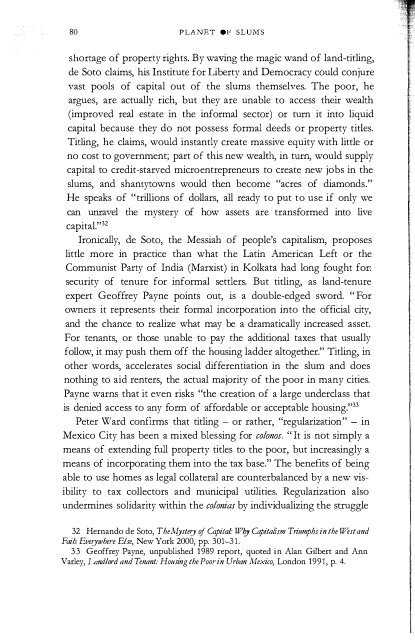Untitled - Rebel Studies Library
Untitled - Rebel Studies Library
Untitled - Rebel Studies Library
You also want an ePaper? Increase the reach of your titles
YUMPU automatically turns print PDFs into web optimized ePapers that Google loves.
80 PLANET OF SLUMS<br />
shortage of property rights. By waving the magic wand of land-titling,<br />
de Soto claims, his Institute for Liberty and Democracy could conjure<br />
vast pools of capital out of the slums themselves. The poor, he<br />
argues, are actually rich, but they are unable to access their wealth<br />
(improved real estate in the informal sector) or turn it into liquid<br />
capital because they do not possess formal deeds or property titles.<br />
Titling, he claims, would instantly create massive equity with little or<br />
no cost to government; part of this new wealth, in turn, would supply<br />
capital to credit-starved micro entrepreneurs to create new jobs in the<br />
slums, and shantytowns would then become "acres of diamonds."<br />
He speaks of "trillions of dollars, all ready to put to use if only we<br />
can unravel the mystery of how assets are transformed into live<br />
capitaL"32<br />
Ironically, de Soto, the Messiah of people's capitalism, proposes<br />
little more in practice than what the Latin American Left or the<br />
Communist Party of India (Marxist) in Kolkata had long fought for:<br />
security of tenure for informal settlers. But titling, as land-tenure<br />
expert Geoffrey Payne points out, is a double-edged sword. "For<br />
owners it represents their formal incorporation into the official city,<br />
and the chance to realize what may be a dramatically increased asset.<br />
For tenants, or those unable to pay the additional taxes that usually<br />
follow, it may push them off the housing ladder altogether." Titling, in<br />
other words, accelerates social differentiation in the slum and does<br />
nothing to aid renters, the actual majority of the poor in many cities.<br />
Payne warns that it even risks "the creation of a large underclass that<br />
is denied access to any form of affordable or acceptable housing."33<br />
Peter Ward confirms that titling - or rather, "regularization" - in<br />
Mexico City has been a mixed blessing for colonos. "It is not simply a<br />
means of extending full property titles to the poor, but increasingly a<br />
means of incorporating them into the tax base." The benefits of being<br />
able to use homes as legal collateral are counterbalanced by a new visibility<br />
to tax collectors and municipal utilities. Regularization also<br />
undermines solidarity within the colonias by individualizing the struggle<br />
32 Hernando de Soto, TheMystey of Capital.- W0 Capitalism Triumphs in the West and<br />
Failr Everywhere Else, New York 2000, pp. 301-31.<br />
33 Geoffrey Payne, unpublished 1989 report, quoted in Alan Gilbert and Ann<br />
Varley, Landlord and Tenant: Housing the Poor in Urban Mexico, London 1991, p. 4.<br />
ILLUSIONS OF SELF-HELP 81<br />
for housing and by giving titled homeowners interests that differ from<br />
those of other slum residents. "Renters, harassed squatters, displaced<br />
downtown tenants," argues Ward, "are likely to be more radical and<br />
disposed to anti-government demonstrations than are those who have,<br />
in effect, been bought-off by the government through successive<br />
housing policies."34<br />
This has even been the case in Sao Paulo, where Workers' Party (PT)<br />
administrations, starting in 1989, have tried to regularize and upgrade<br />
the "huge illegal city" of the poor. Although the PT's reforms have<br />
produced some admirable results, Suzana Taschner, who has carefully<br />
studied the local impact, points to negative repercussions as well:<br />
"Unfortunately, with the upgrading, the real estate submarket consolidates<br />
in the favela. Both land and houses become consumption goods<br />
and the price soars." One result is the emergence of what Taschner<br />
calls the "slum within the favela," as squatters' homes are replaced by<br />
shoddy cortifos (tenements) renting single rooms to the poorest of the<br />
poor.35 Without decisive public intervention in real-estate markets, in<br />
other words, titling by itself is hardly an Archimedean lever to raise the<br />
fortunes of the great mass of poor urban dwellers.<br />
However, de Sotoan panaceas remain immensely popular for obvious<br />
reasons: the titling strategy promises big social gains with a mere act of<br />
the pen and, thus, pumps life back into the World Bank's tired self-help<br />
paradigms; it accords perfectly with dominant neoliberal, anti-state<br />
ideology, including the Bank's current emphasis on government facilitation<br />
of private housing markets and the promotion of broad home<br />
ownership; and it is equally attractive to governments because it<br />
promises them something - stability, votes, and taxes - for virtually<br />
nothing. "The acceptance of unauthorized settlements," Philip Amis<br />
points out, "is a relatively painless, and potentially profitable, way to<br />
appease the urban poor in the Third World."36 And, as geographers<br />
Alan Gilbert and Ann Varley emphasize in the case of Latin America,<br />
it is also a classical conservative reform: "The very nature of the selfhelp<br />
housing process has ... contributed to political placidity.<br />
34 Ward, Mexico City, p. 193.<br />
35 Suzana Taschner, "Squatter Settlements and Slums in Brazil," in Aldrich and<br />
Sandhu, Housing the Urban Poor, pp. 216-19.<br />
36 Amis, "Commercialized Housing in Nairobi," p. 237.


